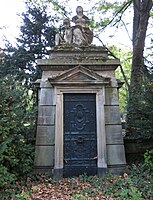Franz Koenigs
Franz Wilhelm Koenigs (born September 3, 1881 in Kierberg ; † May 6, 1941 in Cologne ) was a German-Dutch banker and art collector.
banker
Koenigs came from a German banking family. He was personally liable partner or partner in the banks Delbrück, Schickler & Co. , Berlin, and Delbrück, von der Heydt & Co., Cologne (founded in 1919). After founding the bank Rhodius Koenigs Handel Maatschappij, based in Amsterdam , Koenigs moved his center of life more and more to the Netherlands in the 1920s . At that time he was a major transnational private banker. Among other things, he was the teacher of the German banker Hermann Josef Abs (1901-1994). In 1929 he joined the Society of Friends .
Art collector
In addition, Koenigs was able to build up an outstanding private collection of old masters and to advance to one of the most influential art collectors in this field internationally. The “Koenigs Collection” finally comprised 46 paintings and 2,761 drawings; including works by Rembrandt , Bosch and Fra Bartolommeo .
During the Nazi era Koenigs, who had taken Dutch citizenship in 1939 , got more and more between the fronts. Based on the current state of knowledge, it can be assumed that on the one hand he worked with the Nazi authorities and on the other hand passed on information about National Socialist Germany to Western secret services. Koenigs also endeavored to completely preserve or save his art collection from possible access by National Socialist art thieves by transferring it to a foundation or relocating it abroad. After the German invasion of the Netherlands in 1940, however, he was probably forced to sell parts of his collection to buyers from the National Socialists. The Koenigs collection was then broken up.
In 1940/41 Koenigs was suspected by the Gestapo of supporting Jews in their escape from the German Reich and of having participated in transfers of “flight funds” that were prohibited by the Reich government. In March 1941, Koenigs was therefore temporarily imprisoned. On May 6, 1941, Koenigs died at the main train station in Cologne under circumstances that had not yet been clarified. It may have been an accident, but he may have been murdered.
The whereabouts and transfers of ownership of the Koenig's collection after 1941 raise a number of questions to this day - significant parts of it even made it to the Soviet Union as looted art.
Franz Koenigs was married to Countess Anna von Kalckreuth (1883–1963), the daughter of the painter Leopold von Kalckreuth . Your children and grandchildren now live in the Netherlands and Germany. Koenigs and his wife are buried in the family crypt on the Melaten cemetery in Cologne (MA, between lit. P + Q).
literature
- Christine Koenigs: Support of the German resistance. Franz Koenigs and Hans Leibholz , in: Detlef J. Blesgen (ed.), Financiers, Finances and Financing of Resistance, Berlin 2006, pp. 137–164
- Albert J. Elen: Missing Old Master Drawings from the Franz Koenigs Collection claimed by the State of The Netherlands , Den Haag 1989
Individual evidence
- ^ Dieter Ziegler: Business specializations of German private bankers in the interwar period. A vain struggle for survival? , in: Institute for Bank History Research (ed.), Der Privatbankier. Niche strategies in the past and present, Stuttgart 2003, p. 34.
- ^ Lothar Gall: The banker Hermann Josef Abs. A biography , Munich 2004, pp. 23-28.
- ↑ Max J. Friedländer (ed.): Master drawings from the Franz Koenigs collection , Haarlem. French masters of the XVIII century. Edited by CF Foerster, Frankfurt a. M. 1930.
- ↑ Christine Koenigs: Support of the German resistance. Franz Koenigs and Hans Leibholz , in: Detlef J. Blesgen (ed.), Financiers, Finances and Financing of Resistance, Berlin 2006, p. 139 f.
- ↑ Gerard Aalders: Robbed! The expropriation of Jewish property in World War II , Cologne 2000, pp. 126–129.
- ↑ Christine Koenigs: Support of the German resistance. Franz Koenigs and Hans Leibholz , in: Detlef J. Blesgen (ed.), Financiers, Finances and Financing of Resistance, Berlin 2006, p. 146.
- ^ Albert J. Elen: Missing Old Master Drawings from the Franz Koenigs Collection claimed by the State of The Netherlands , Den Haag 1989.
| personal data | |
|---|---|
| SURNAME | Koenigs, Franz |
| ALTERNATIVE NAMES | Koenigs, Franz Wilhelm (full name) |
| BRIEF DESCRIPTION | German-Dutch banker and art collector |
| DATE OF BIRTH | September 3, 1881 |
| PLACE OF BIRTH | Kierberg |
| DATE OF DEATH | May 6, 1941 |
| Place of death | Cologne |

